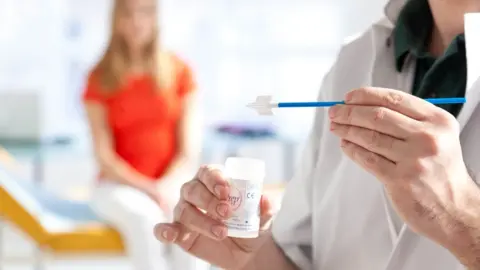Thousands caught up in 'appalling' cervical screening blunder
 Science Photo Library
Science Photo LibraryMore than 40,000 women in England have not received information regarding cervical cancer screening after a failure to send out letters by the NHS.
The errors were made between January and June.
Around 4,000 of them were results of tests, the remainder were letters inviting them for screening or reminding them they were due.
Between 150 and 200 of the test results that were not sent out were abnormal results.
But it is thought their intended recipients should have received at least one notification from their GP or screening clinic - as women with abnormal results should be sent letters from two or three sources.
NHS England are checking this has happened and that abnormal results are being followed up properly with further testing.
So far it has contacted nearly half of this group and says no harm has been caused.
The service is provided for NHS England by Capita.
Around 4.5 million women aged 25 to 64 receive invitations for screening each year.
Those aged 25 to 49 are offered screening every three years, with the older age groups invited every five years.
The news comes just months after it emerged 174,000 women had not been invited for breast cancer screening after mistakes went undetected for years.
Capita was not involved in that service.
'Frankly appalling'
In comparison with the breast screening mistake, this problem has been spotted much more quickly.
All those who did not receive an invite letter or reminder have been written to. It is believed 10,000 of them have already been tested.
A spokesman for Capita said the company "apologises" for the mistake.
He said the correct process for "uploading, organising and checking" had not been followed and appropriate disciplinary action was being taken.
The senior manager responsible for the contract has left the company.
NHS England said there was no current evidence any woman had been harmed and the priority now was to ensure everyone affected was contacted.
But Dr Richard Vautrey, of the British Medical Association, said the situation was "frankly appalling".
"We know that, because of the nature of this procedure, many patients are already reluctant to attend these appointments, and therefore reminder letters are crucial.
"Incidents like this, therefore, will hardly inspire confidence in the system and risk even fewer women getting checked," he said.
Dr Vautrey said Capita's handling of the service had been "nothing short of shambolic" and called for the firm to be stripped of the contract.
